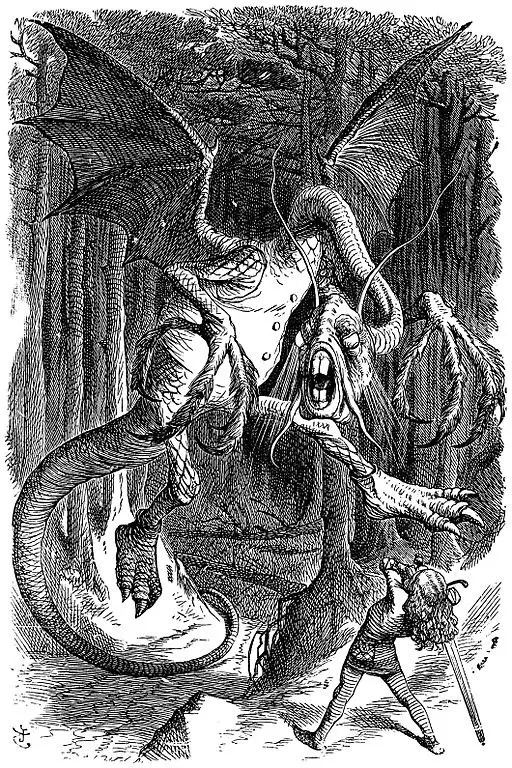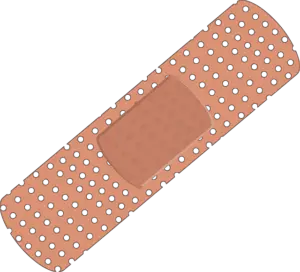Forming New Words: Coinages, Nonce Words, English Loanwords and Calques
Coinages
Coinage is the word formation process in which a new word is created either deliberately or accidentally without using the other word formation processes and often from seemingly nothing. For example, the following list of words provides some common coinages found in everyday English:
- aspirin
- escalator
- heroin
- band-aid
- factoid
- Frisbee
- kerosene
- Kleenex
- Laundromat
- linoleum
- muggle
- nylon
- psychedelic
- quark
- Xerox
- zipper
[caption id=“attachment_130718” align=“aligncenter” width=“300”]
Nonce Words
[caption id=“attachment_130717” align=“aligncenter” width=“512”] The Jaberwocky is an example of nonce words[/caption] Nonce words are new words formed through any number of word formation processes with the resulting word meeting a lexical need that is not expected to recur. Nonce words are created for the nonce, the term for the nonce meaning “for a single occasion.” For example, the follow list of words provides some nonce words with definitions as identified in the Oxford English Dictionary.
The Jaberwocky is an example of nonce words[/caption] Nonce words are new words formed through any number of word formation processes with the resulting word meeting a lexical need that is not expected to recur. Nonce words are created for the nonce, the term for the nonce meaning “for a single occasion.” For example, the follow list of words provides some nonce words with definitions as identified in the Oxford English Dictionary.
- cotton-wool – to stuff or close (the ears) with cotton-wool.
- jabberwock – The name of the fabulous monster in Lewis Carroll’s poem Jabberwocky. Hence in allusive and extended uses, especially “incoherent or nonsensical expression.” So jabberwocky is invented language, meaningless language, nonsensical behavior; also nonsensical, meaningless, topsy-turvy.
- touch-me-not-ishness – having a “touch-me-not” character; stand-off-ish.
- twi-thought – an indistinct or vague thought.
- witchcraftical – The practices of a witch or witches; the exercise of supernatural power supposed to be possessed by persons in league with the devil or evil spirits. Power or influence like that of a magician; bewitching or fascinating attraction or charm.
Note that although most nonce words come in and out of use very quickly, some nonce words catch on and become everyday words. For example, Lewis Carroll coined the word chortle, a blend of chuckle and snort, for the poem Jabberwocky in the book Through the Looking-Glass and What Alice Found There; unlike most nonce words, however, chortle has gained acceptance as a legitimate blended word.
English Loanwords
Loanwords are the word formation process in which a word from one language is borrowed directly into another language. For example, the following common English words are borrowed from foreign languages:
- algebra – Arabic
- bagel – Yiddish
- cherub – Hebrew
- chow mein – Chinese
- fjord – Norwegian
- galore – Irish
- haiku – Japanese
- kielbasa – Polish
- murder – French
- near – Sanskrit
- paprika – Hungarian
- pizza – Italian
- smorgasbord – Swedish
- tamale – Spanish
- yo-yo – Tagalog
English loanwords are also referred to as borrowed.
Calquing
Calquing is the word formation process in which a borrowed word or phrase is translated from one language to another. For example, the following common English words are calqued from foreign languages:
- beer garden – German – Biergarten
- blue-blood – Spanish – sangre azul
- commonplace – Latin – locus commūnis
- flea market – French – marché aux puces
- free verse – French – vers libre
- loanword – German – Lehnwort
- long time no see – Chinese – hǎo jiǔ bu jiàn
- pineapple – Dutch – pijnappel
- scapegoat – Hebrew – ez ozel
- wisdom tooth – Latin – dēns sapientiae
Calques are also referred to as root-for-root or word-for-word translations. Image Credits Image by Clker-Free-Vector-Images from Pixabay Jaberwock Image
This post is part of the series: Word Formation: Creating New Words in English
The articles in this series define and exemplify the most common word formation processes, or the creation of new words, in English including derivation, back-formation, conversion, compounding, clipping, blending, abbreviations, acronyms, eponyms, coinages, nonce words, borrowing, and calquing.
